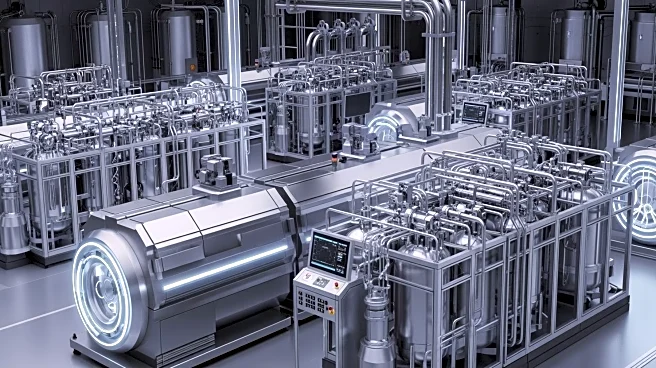What's Happening?
Prolific Machines, led by research fellow Shahram Misaghi, PhD, is advancing the speed and scalability of upstream bioprocessing for monoclonal and bispecific antibodies. Misaghi, with over two decades
of experience in biomanufacturing stable and inducible systems, is leveraging his expertise to enhance the company's cell line development capabilities. His work includes chemical inducible gene expression applications in CHO cell line development, which have been recognized as industry best-in-class for titers. Misaghi's background includes significant contributions at Genentech, where he was part of the team that developed a targeted integration platform. His academic credentials include a PhD from Harvard University, where he studied viral immune evasion processes, and a bachelor's degree from the University of California Berkeley, focusing on multidrug resistant pumps in bacteria.
Why It's Important?
The advancements in bioprocessing by Prolific Machines have significant implications for the biotechnology industry, particularly in the production of therapeutic antibodies. By improving the speed and scalability of antibody production, the company is potentially reducing costs and increasing the availability of these critical treatments. This can lead to more efficient drug development processes and faster delivery of therapies to patients, addressing urgent healthcare needs. The work of Shahram Misaghi and his team could also set new industry standards, influencing how other companies approach cell line development and biomanufacturing.
What's Next?
Prolific Machines may continue to refine their bioprocessing techniques, potentially expanding their applications beyond monoclonal and bispecific antibodies. The industry could see increased collaboration between companies to adopt these advanced methods, leading to broader improvements in biomanufacturing. Regulatory bodies might also take interest in these developments, considering new guidelines or standards to ensure quality and efficiency in antibody production.
Beyond the Headlines
The ethical implications of bioprocessing advancements include considerations around accessibility and affordability of treatments. As production becomes more efficient, there is potential for reduced costs, which could make therapies more accessible to a wider population. Additionally, the environmental impact of biomanufacturing processes may be scrutinized, prompting companies to adopt more sustainable practices.









